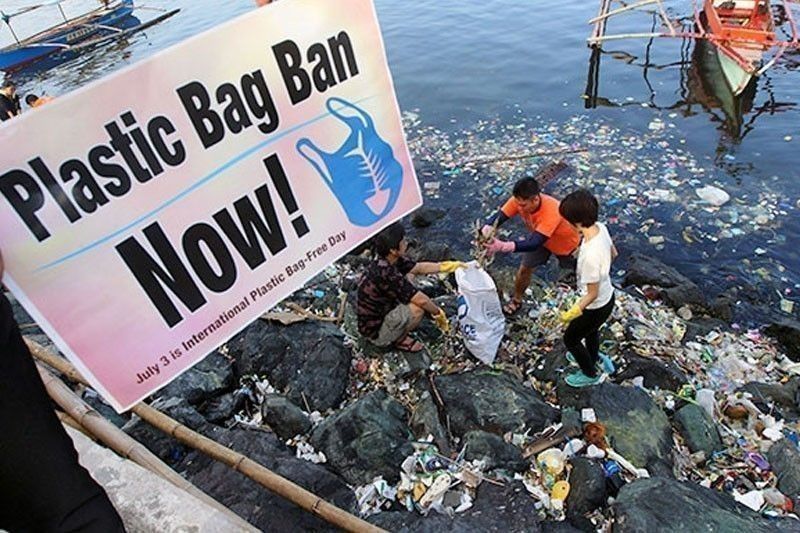Gov't urged to mandate plastic reduction as part of urgent climate action

MANILA, Philippines — Environmental group Greenpeace Philippines on Wednesday called on the authorities to regulate plastic production and enact a strong legislation banning the use of single-use plastics as part of the government’s climate action.
In a statement, Greenpeace said the government needs to “mandate plastic reduction and reuse systems in the consumer goods industry to prevent further global heating.”
It urged senators to pass a more stringent and comprehensive bill that will prohibit the production and use of single-use plastic products and packaging, noting that the version passed by the House of Representatives “supports false solution.”
The group issued the call following the release of a Greenpeace report, which found that consumer goods companies such as Nestlé, Coca-Cola and Unilever are driving the expansion of plastic production and contributing to climate change with their greenhouse gas emissions.
Without immediate action, plastic production could triple by 2050, according to industry estimates. This projected growth in plastic production would increase global emissions from the plastic life cycle to an equivalent of 300 coal power plants by 2030.
The report also identified the links between the world’s largest brands and fossil fuel companies.
“These big brands often promote their climate commitments to much fanfare, but in reality, they are actively contributing to the climate crisis and its impacts, such as worsening typhoons, flooding, food insecurity, loss of livelihoods, and loss of life for Filipinos,” Greenpeace zero waste campaigner Marian Ledesma said.
Greenpeace called on companies to move toward systems of reuse and package-free products.
“If they genuinely care about their impact on the environment and people, they would sever their ties with fossil fuels and make urgent commitments to phase out disposable plastic packaging and transition to reusable and packaging-free systems,” Ledesma said.
Follow this page for updates about climate change and information on current environmental issues. Main photo by Efigenio Toledo IV
Britain's Conservative government announces new plans to "support drivers" and push back on "anti-car measures" as some opposition-led areas move to impose restrictions on the use of motor vehicles in the name of environmental protection.
"The clamp down on drivers is an attack on the day to day lives of most people across the UK who rely on cars to get to work or see their families," Prime Minister Rishi Sunak says in a statement announcing the new plans.
"This week the UK government will set out a long-term plan to back drivers, slamming the brakes on anti-car measures across England. We are taking the necessary decision to back the motorists who keep our country moving." — AFP
Researchers say marine heatwaves may last longer and be more intense in deeper water, potentially threatening sensitive species as climate change makes the extreme events more frequent.
Oceans have absorbed 90% of the excess heat produced by the carbon pollution from human activity since the dawn of the industrial age.
Marine heatwaves -- episodes of abnormally high water temperatures -- have become more frequent and intense. — AFP
The government says Hong Kong experienced its hottest summer on record this year, with the city seeing "record-breaking" temperatures.
"Together with the exceptionally hot weather in June and July, Hong Kong experienced the hottest summer on record from June to August 2023," it says in a press release. — AFP
The weather agency says Japan's summer this year was the country's hottest since records began in 1898.
"In the summer (June-August) of 2023, the average summer temperature in Japan was considerably higher in northern, eastern, and western Japan. Average temperatures in Japan are the highest for summer since 1898," the agency says.
"The average temperature anomaly in Japan, based on observations at 15 locations, was +1.76 degrees C, far exceeding that of 2010 (+1.08 degrees C), which was the highest since statistics began in 1898 and the highest for summer," it says in a statement.
"Warm air tended to cover northern Japan and warm air flowed in from the south, resulting in considerably higher average summer temperatures in northern, eastern, and western Japan," it adds. — AFP
European climate service Copernicus announces Tuesday that July 2023 easily broke the record for the hottest month ever recorded on Earth, beating the previous record which was July 2019 by 0.33 degrees Celsius.
Marred by heatwaves and wildfires around the globe, last month also saw average air temperatures 0.72 degrees hotter than recent July averages from 1991 - 2020. — AFP
- Latest
- Trending

































